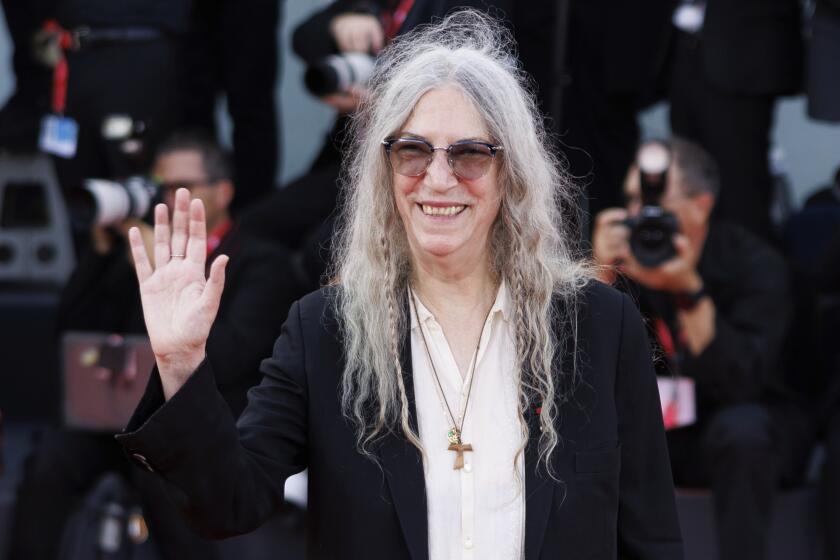Appreciation: Leon Russell: A half-century of musical genius that spanned from Jerry Lee Lewis to Amy Winehouse
- Share via
Leon Russell called his best-known composition “A Song for You,” but a better title might’ve been “A Song for You — and You and You and You and You.”
The heartfelt ballad, instantly recognizable from its opening cascade of delicate piano notes, first appeared on Russell’s self-titled debut album in 1970. That’s a decade after this singer, songwriter and multi-instrumentalist — who died Sunday at age 74 — moved to Los Angeles from his native Oklahoma and quickly established himself as a go-to session player.
Since then, though, “A Song for You” has been recorded and performed hundreds of times by artists as diverse as Donny Hathaway, the Carpenters, Willie Nelson, Amy Winehouse and the rapper Bizzy Bone. In 1994, Ray Charles won a Grammy for his moving rendition of the tune.
That range of interpretations demonstrates the remarkable breadth of Russell’s musical vision: One reason “A Song for You” could be convincingly remade as a loping country ditty or a woozy R&B jam is because those styles were already baked into it (as they were in other hard-to-classify songs of his such as “This Masquerade” and “Tight Rope”).
But it also points to another quality not commonly celebrated in pop, and that’s Russell’s creative selflessness — how willing he was over the course of his half-century career to put himself behind the artists for whom he was writing or playing.
The list of his sideman gigs stretches back to his arrival in L.A., when he began booking sessions with the likes of Phil Spector and Brian Wilson, to name two studio obsessives whose detailed ideas Russell helped to carry out. Later he put together the Mad Dogs & Englishmen band for Joe Cocker, backed George Harrison at the former Beatle’s all-star Concert for Bangladesh and produced two songs — “Watching the River Flow” and “When I Paint My Masterpiece” — for Bob Dylan.
With his scraggly long hair and beard — not to mention his scuffed-up singing voice — Russell wasn’t exactly a wallflower in these collaborations. Yet his goal always appeared to be the best musical moment possible rather than the moment that glorified him personally; that applied to his solo records too, which often felt more like showcases for the groups of top-notch musicians he assembled.
Russell’s team spirit may have been a byproduct of his apparent disinterest in stardom. In 1970 he told Rolling Stone why he took an early job on the road with Jerry Lee Lewis: “I figured this was my chance to eat in a lot of restaurants,” he said.
A few years after that interview, he began releasing country albums under a pseudonym, Hank Wilson — hardly an eager bid for added visibility. And though he was sufficiently familiar with the experience of celebrity to write “Superstar” — another of his songs best known for others’ renditions (including those by the Carpenters and Luther Vandross) — it says plenty about him that the tune is sung from the perspective not of a pop star but of a pop star’s admirer.
“Your guitar, it sounds so sweet and clear,” the lyric goes, a vivid confession from someone in love above all with listening.
Russell never retired from music; he continued to perform and release albums through the ’90s and ’00s and had plans to tour next year. Fittingly, though, it was another joint project that attracted his final burst of attention: a 2010 duo album with Elton John called “The Union.”
The record received great reviews and led indirectly to Russell’s being inducted into the Rock and Roll Hall of Fame. And at the ceremony in 2011, he spent all of six seconds basking in congratulations before shifting focus to John, whom he thanked for rescuing him from “a ditch by the side of the highway of life.”
Knowing Russell, he probably offered his friend a spot in the ditch before he allowed himself to climb out.
Twitter: @mikaelwood
ALSO
Obituary: Leon Russell dies at 74
Leonard Cohen dies at 82, singer-songwriter of ‘Hallelujah’ had a literary sensibility
What did Leonard Cohen really mean when he sang ‘Hallelujah’?
More to Read
The biggest entertainment stories
Get our big stories about Hollywood, film, television, music, arts, culture and more right in your inbox as soon as they publish.
You may occasionally receive promotional content from the Los Angeles Times.










